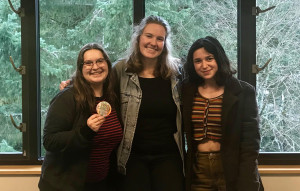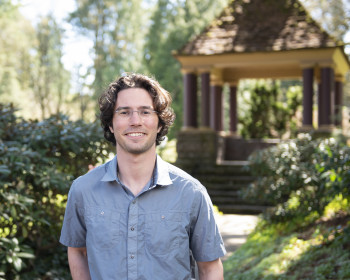Who Cares? This Year’s Gender Studies Symposium

by Franchesca Schrambling BA ’22
What is the value of care? What causes care to become concealed, feminized, or invalidated? What can be done to challenge the preexisting notions of care and gender?

Symposium topics will approach care in a wide variety of contexts: self-care, domestic care work, paid and unpaid care labor, bodily autonomy, medical care, and care as a form of resistance.
“This symposium challenges pre-existing frameworks of care and gender, while also posing new approaches to thinking about and enacting care—for ourselves, for our communities, and for our world at large,” said Glavin, a sociology and anthropology major and gender studies minor from Chicago, Illinois.
Maughan, a history major and gender studies minor from Caldwell, Idaho, added: “Care is part of everyday life that should be recognized and normalized, from unpaid domestic care work to reproductive justice to humanitarian aid. It’s a crucial part of the human experience.”
The symposium will feature three keynote speakers.
- Wednesday, March 13: Monica Raye Simpson, activist, performer, and executive director of SisterSong Women of Color Reproductive Justice Collective, will present “Redefining and Transforming the Concept of Care: A Reproductive Justice Approach.”
- Thursday, March 14: Anna Guevarra, award-winning associate professor and founding director of the Global Asian Studies program at the University of Illinois at Chicago, will examine racial branding, the Philippine system of care workers, and the implications of global care chains in “From Heroes and Supermaids to TNTs: Racial Branding and the Geopolitics of Care Work.”
- Friday, March 15: Closing the symposium will be award-winning author Maggie Nelson, recipient of a MacArthur Foundation “Genius Grant” and professor of English at the University of Southern California. She will present “Songs of Care and Constraint” in Agnes Flanagan Chapel.
According to the cochairs, a central goal when crafting this symposium was to try and make it more accessible and engaging for those with less direct connections to gender studies as a discipline. The wide variety of events during the daytime sessions reflects this. Notable events include a roundtable discussion around gender disparities in STEM (science, technology, engineering, and math), several workshops oriented around everyday language, self-advocacy, and improv, and panels featuring L&C students, alumni, and staff.
“Meta-Performances of Gender: Improv as Agency” will feature members of The Swamp, an on-campus improv troupe that critically engages with gender performance and humor. Joshua Wright’s “The Masking of Self in Captive Spaces” will be based on their experience in prison for over four years, where they cofounded the first gender and sexuality class in the Oregon Department of Corrections and founded a social justice reading group. “It’s Personal!: Embodied Narratives of Health Care” and “The World Doesn’t Care but I Do: Community Organizing and Social Justice in the Archive” will approach care through the lens of community.
In addition to the event’s keynotes, students and guests will hear from members of the Portland community, L&C faculty, and alumni.
“This year’s symposium is about the way in which we as a society, both on an individual and institutional level, care for one another,” Strickler, a psychology major and gender studies minor from Sherman Oaks, California, commented. “This is a rare opportunity where we can explore the reasons why and how care practices are the way that they are, and what are the influences behind them.”
A full schedule of events and other event details can be found here.
More Newsroom Stories
Public Relations is located in McAfee on the Undergraduate Campus.
MSC: 19
email public@lclark.edu
voice 503-768-7970
Public Relations
Lewis & Clark
615 S. Palatine Hill Road MSC 19
Portland OR 97219

